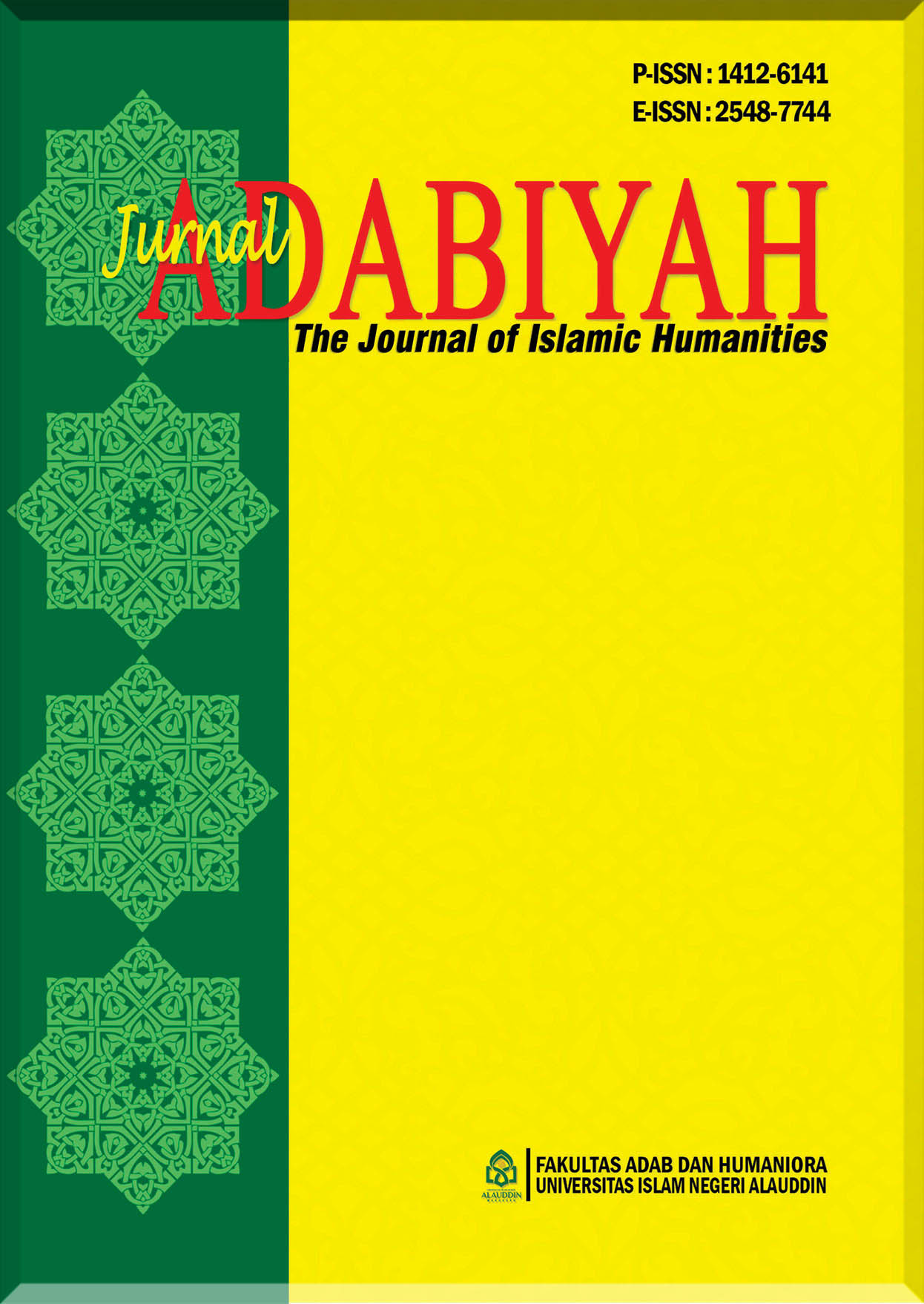Contextualization And Entextualization Mandarese Patriotism In Kalindaqdaq Pettomuaneang Performance
Main Article Content
Abstract
Kalindaqdaq is one literary work of Mandarese, the majority ethnic in West Sulawesi. It is categorized as an old poem, and nowadays Kalindaqdaq is only shown in a few cultural events. The objective of this research is to explore Mandarese local wisdom related to patriotism through contextualizing and entextualizing Kalindaqdaq Pettomuaneang. This research used a qualitative method with two approaches; systemic functional and ethnographical approach. The result shows that the emergence of Kalindaqdaq Pettomuaneang was influenced by the political situation. Based on its contextualization, there are three characteristics of an ideal leader. They must have sincerity, consistency, and firmness. Next, intextuality involved some contexts. Texts in manetteq context are decontextualized such as manetteq (weave), lipaq (sarong), bannang pute (white yarn), lango-lango (dye), sureq (motif), and pucca (center of motif), and after that, they are recontextualized in patriotism as its new context. Leadership is seen as the same as weaving process, not only be carefulness, a good leader should be creative. So seeing the success of contextualization and entextualization in Kalindaqdaq Pettomuaneang, it can be concluded that Mandarese is ethnic with high cognitive characteristics. Because of to do contextualization and entextualization, people should have specific competence in language and logic.
Downloads
Article Details
COPYRIGHT AND LICENSE STATEMENT
COPYRIGHT
Jurnal Adabiyah is published under the terms of the Creative Commons Attribution license. Authors hold the copyright and retain publishing rights without restriction to their work. Users may read, download, copy, distribute, and print the work in any medium, provided the original work is properly cited.
LICENSE TO PUBLISH
1. License
The use of the article will be governed by the Creative Commons Attribution license as currently displayed on http://creativecommons.org/licenses/by/4.0.
2. Author’s Warranties
The author warrants that the article is original, written by stated author/s, has not been published before, contains no unlawful statements, does not infringe the rights of others, is subject to copyright that is vested exclusively in the author and free of any third party rights, and that any necessary written permissions to quote from other sources have been obtained by the author(s).
3. User Rights
Under the Creative Commons Attribution license, the users are free to download, reuse, reprint, modify, distribute and/or copy the content for any purpose, even commercially, as long as the original authors and source are cited. No permission is required from the authors or the publishers.
4. Co-Authorship
If the article was prepared jointly with other authors, the corresponding author warrants that he/she has been authorized by all co-authors, and agrees to inform his/her co-authors of the terms of this statement.
5. Miscellaneous
Jurnal Adabiyah may conform the article to a style of punctuation, spelling, capitalization, and usage that it deems appropriate. The author acknowledges that the article may be published so that it will be publicly accessible and such access will be free of charge for the readers.
References
Bodi, Idham Khalik. (2008). Kalindaqdaq Masaala”, Makassar: Sarwah Press.
Butt, David., et.al. (2001). Using Functional Grammar: An Explorer’s Guide. Sydney: National Centre for English Language Teaching and Research.
Central Bureau of Statistic West Sulawesi Province, “Jumlah Penduduk menurut Kabupaten/Kota, 2010-2015”, accessed from http://sulbar.bps.go.id/, on January, 11st 2017 at 1 pm
Fairclough, Norman. (1996). Language and Power. USA: Longman Inc.
Gershenson, Carlos. (2002). Contextuality: A Philosophical Paradigm, with Application to Philosophy of Cognitive Science. Accessed from https://www.researchgate.net/publication/ on February, 11st 2017 at 8 am.
Geeraerts, Dirk. (2002). “Decontextualizing and Recontextualizing Tendencies in 20th Centiries (Lingustics & Literary Theory)” In Ewald Mengel, Hans-Joerg Schmid & Michael Steppat (eds.). Accessed from http://www.ling.art.kuleuven.be on February, 12nd 2017 at 2 p.m
Government of Polewali Mandar Regency, “Lembaran Daerah Kabupaten Polewali Mandar Tahun 2006 Nomor 16”, accessed from http://ditjenpp.kemenkuham.go.id, on December, 26th 2016 at 1 pm
Hornby, A. S. (1995). Oxford Advanced Learner’s Dictionary. Oxford:Oxford University Press.
Mattulada. (1974). Bugis-Makassar, Manusia dan Kebudayaannya in Berita Antropologi, No.16. Archives of Literature Faculty, UI, 1974.
Sjam, A.M. Sarbin. (1997). Bunga Rampai Kebudayaan Mandar dari Balanipa. Limboro: Pemerintah Kabupaten Polewali Mamasa.
Sparadley, James P. (1980) Participant Observation. USA: Holt, Rinehart and Winston.
Ratna, Nyoman Kutha. (2011) Antropologi Sastra (Peran Unsur-Unsur Kebudayaan dalam Proses Kreatif). Yogyakarta: Pustaka Pelajar.
Sandarupa, Stanislaus. (2013). The Poetry of Taking Power in Toraja Indonesia. in Research on Humanities and Social Sciences Vol.3, No.19, 2013, accessed in http://www.iiste.org on February, 11st 2017.
Srimusdikawati. (2017). Pengembangan Bahan Ajar Bahasa dan Sastra Mandar Berbasis Karakter Malaqbiq di Sekolah Dasar Kabupaten Polewali Mandar. Archives of Postgraduated Program, UNM, 2017.

